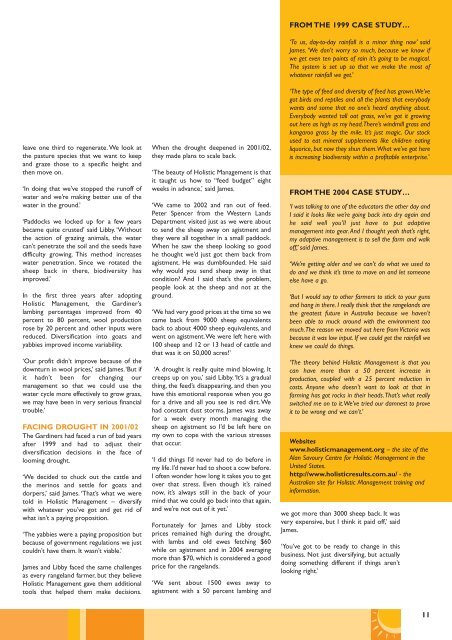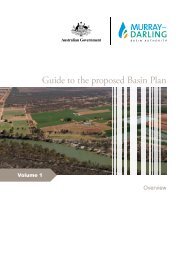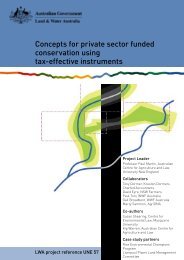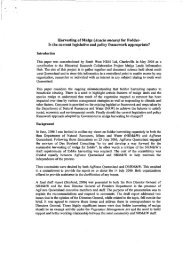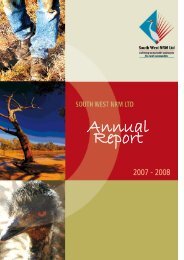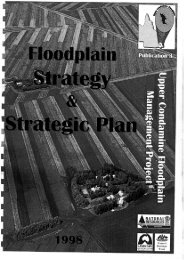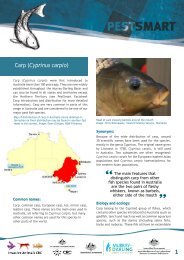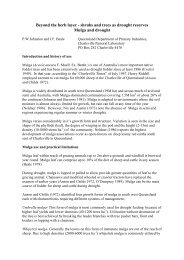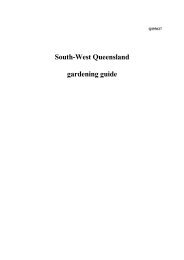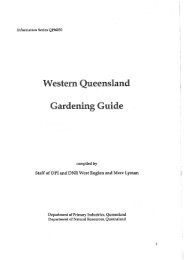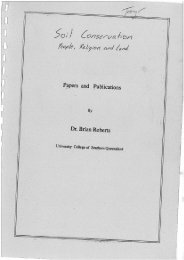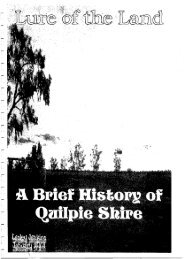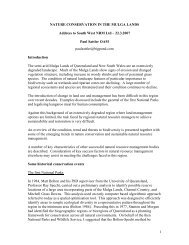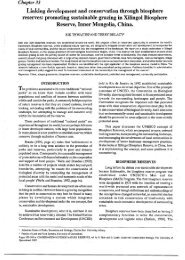Masters of the Climate: Innovative farmers ... - South West NRM
Masters of the Climate: Innovative farmers ... - South West NRM
Masters of the Climate: Innovative farmers ... - South West NRM
Create successful ePaper yourself
Turn your PDF publications into a flip-book with our unique Google optimized e-Paper software.
leave one third to regenerate. We look at<br />
<strong>the</strong> pasture species that we want to keep<br />
and graze those to a specific height and<br />
<strong>the</strong>n move on.<br />
‘In doing that we’ve stopped <strong>the</strong> run<strong>of</strong>f <strong>of</strong><br />
water and we’re making better use <strong>of</strong> <strong>the</strong><br />
water in <strong>the</strong> ground.’<br />
‘Paddocks we locked up for a few years<br />
became quite crusted’ said Libby. ‘Without<br />
<strong>the</strong> action <strong>of</strong> grazing animals, <strong>the</strong> water<br />
can’t penetrate <strong>the</strong> soil and <strong>the</strong> seeds have<br />
difficulty growing. This method increases<br />
water penetration. Since we rotated <strong>the</strong><br />
sheep back in <strong>the</strong>re, biodiversity has<br />
improved.’<br />
In <strong>the</strong> first three years after adopting<br />
Holistic Management, <strong>the</strong> Gardiner’s<br />
lambing percentages improved from 40<br />
percent to 80 percent, wool production<br />
rose by 20 percent and o<strong>the</strong>r inputs were<br />
reduced. Diversification into goats and<br />
yabbies improved income variability.<br />
‘Our pr<strong>of</strong>it didn’t improve because <strong>of</strong> <strong>the</strong><br />
downturn in wool prices,’ said James.‘But if<br />
it hadn’t been for changing our<br />
management so that we could use <strong>the</strong><br />
water cycle more effectively to grow grass,<br />
we may have been in very serious financial<br />
trouble.’<br />
FACING DROUGHT IN 2001/02<br />
The Gardiners had faced a run <strong>of</strong> bad years<br />
after 1999 and had to adjust <strong>the</strong>ir<br />
diversification decisions in <strong>the</strong> face <strong>of</strong><br />
looming drought.<br />
‘We decided to chuck out <strong>the</strong> cattle and<br />
<strong>the</strong> merinos and settle for goats and<br />
dorpers,’ said James. ‘That’s what we were<br />
told in Holistic Management – diversify<br />
with whatever you’ve got and get rid <strong>of</strong><br />
what isn’t a paying proposition.<br />
‘The yabbies were a paying proposition but<br />
because <strong>of</strong> government regulations we just<br />
couldn’t have <strong>the</strong>m. It wasn’t viable.’<br />
James and Libby faced <strong>the</strong> same challenges<br />
as every rangeland farmer, but <strong>the</strong>y believe<br />
Holistic Management gave <strong>the</strong>m additional<br />
tools that helped <strong>the</strong>m make decisions.<br />
When <strong>the</strong> drought deepened in 2001/02,<br />
<strong>the</strong>y made plans to scale back.<br />
‘The beauty <strong>of</strong> Holistic Management is that<br />
it taught us how to “feed budget” eight<br />
weeks in advance,’ said James.<br />
‘We came to 2002 and ran out <strong>of</strong> feed.<br />
Peter Spencer from <strong>the</strong> <strong>West</strong>ern Lands<br />
Department visited just as we were about<br />
to send <strong>the</strong> sheep away on agistment and<br />
<strong>the</strong>y were all toge<strong>the</strong>r in a small paddock.<br />
When he saw <strong>the</strong> sheep looking so good<br />
he thought we’d just got <strong>the</strong>m back from<br />
agistment. He was dumbfounded. He said<br />
why would you send sheep away in that<br />
condition? And I said that’s <strong>the</strong> problem,<br />
people look at <strong>the</strong> sheep and not at <strong>the</strong><br />
ground.<br />
‘We had very good prices at <strong>the</strong> time so we<br />
came back from 9000 sheep equivalents<br />
back to about 4000 sheep equivalents, and<br />
went on agistment.We were left here with<br />
100 sheep and 12 or 13 head <strong>of</strong> cattle and<br />
that was it on 50,000 acres!’<br />
‘A drought is really quite mind blowing. It<br />
creeps up on you,’ said Libby. ‘It’s a gradual<br />
thing, <strong>the</strong> feed’s disappearing, and <strong>the</strong>n you<br />
have this emotional response when you go<br />
for a drive and all you see is red dirt. We<br />
had constant dust storms. James was away<br />
for a week every month managing <strong>the</strong><br />
sheep on agistment so I’d be left here on<br />
my own to cope with <strong>the</strong> various stresses<br />
that occur.<br />
‘I did things I’d never had to do before in<br />
my life. I’d never had to shoot a cow before.<br />
I <strong>of</strong>ten wonder how long it takes you to get<br />
over that stress. Even though it’s rained<br />
now, it’s always still in <strong>the</strong> back <strong>of</strong> your<br />
mind that we could go back into that again,<br />
and we’re not out <strong>of</strong> it yet.’<br />
Fortunately for James and Libby stock<br />
prices remained high during <strong>the</strong> drought,<br />
with lambs and old ewes fetching $60<br />
while on agistment and in 2004 averaging<br />
more than $70, which is considered a good<br />
price for <strong>the</strong> rangelands.<br />
‘We sent about 1500 ewes away to<br />
agistment with a 50 percent lambing and<br />
FROM THE 1999 CASE STUDY…<br />
‘To us, day-to-day rainfall is a minor thing now’ said<br />
James. ‘We don’t worry so much, because we know if<br />
we get even ten points <strong>of</strong> rain it’s going to be magical.<br />
The system is set up so that we make <strong>the</strong> most <strong>of</strong><br />
whatever rainfall we get.’<br />
‘The type <strong>of</strong> feed and diversity <strong>of</strong> feed has grown.We’ve<br />
got birds and reptiles and all <strong>the</strong> plants that everybody<br />
wants and some that no one’s heard anything about.<br />
Everybody wanted tall oat grass, we’ve got it growing<br />
out here as high as my head.There’s windmill grass and<br />
kangaroo grass by <strong>the</strong> mile. It’s just magic. Our stock<br />
used to eat mineral supplements like children eating<br />
liquorice, but now <strong>the</strong>y shun <strong>the</strong>m.What we’ve got here<br />
is increasing biodiversity within a pr<strong>of</strong>itable enterprise.’<br />
FROM THE 2004 CASE STUDY…<br />
‘I was talking to one <strong>of</strong> <strong>the</strong> educators <strong>the</strong> o<strong>the</strong>r day and<br />
I said it looks like we’re going back into dry again and<br />
he said well you’ll just have to put adaptive<br />
management into gear. And I thought yeah that’s right,<br />
my adaptive management is to sell <strong>the</strong> farm and walk<br />
<strong>of</strong>f,’ said James.<br />
‘We’re getting older and we can’t do what we used to<br />
do and we think it’s time to move on and let someone<br />
else have a go.<br />
‘But I would say to o<strong>the</strong>r <strong>farmers</strong> to stick to your guns<br />
and hang in <strong>the</strong>re. I really think that <strong>the</strong> rangelands are<br />
<strong>the</strong> greatest future in Australia because we haven’t<br />
been able to muck around with <strong>the</strong> environment too<br />
much.The reason we moved out here from Victoria was<br />
because it was low input. If we could get <strong>the</strong> rainfall we<br />
knew we could do things.<br />
‘The <strong>the</strong>ory behind Holistic Management is that you<br />
can have more than a 50 percent increase in<br />
production, coupled with a 25 percent reduction in<br />
costs. Anyone who doesn’t want to look at that in<br />
farming has got rocks in <strong>the</strong>ir heads.That’s what really<br />
switched me on to it.We’ve tried our damnest to prove<br />
it to be wrong and we can’t.’<br />
Websites<br />
www.holisticmanagement.org – <strong>the</strong> site <strong>of</strong> <strong>the</strong><br />
Alan Savoury Centre for Holistic Management in <strong>the</strong><br />
United States.<br />
http://www.holisticresults.com.au/ - <strong>the</strong><br />
Australian site for Holistic Management training and<br />
information.<br />
we got more than 3000 sheep back. It was<br />
very expensive, but I think it paid <strong>of</strong>f,’ said<br />
James.<br />
‘You’ve got to be ready to change in this<br />
business. Not just diversifying, but actually<br />
doing something different if things aren’t<br />
looking right.’<br />
11


